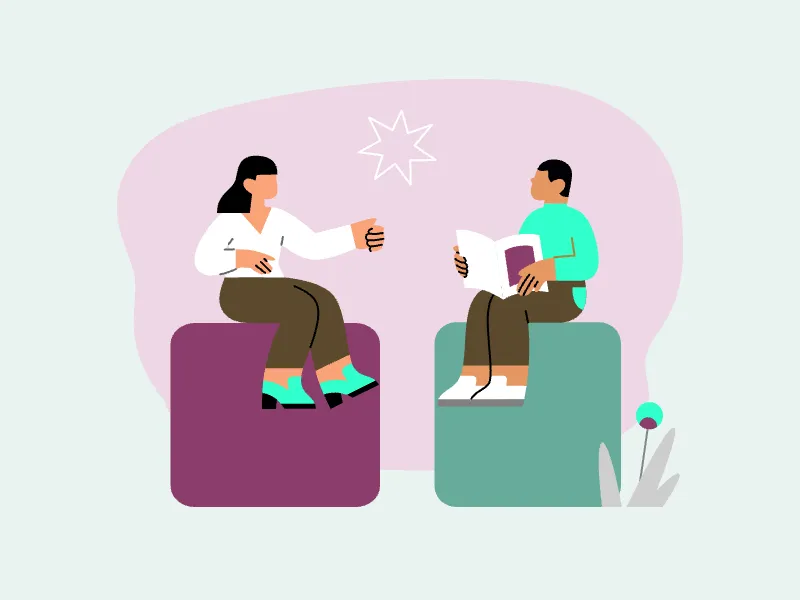New Year’s weight-loss resolutions promote diet culture
Though it may feel like everyone is starting off January 1st with a weight-loss goal, resolutions that focus on dieting and losing weight help perpetuate diet culture and its harmful consequences and it is more than ok to opt out.
In case you aren’t familiar, diet culture refers to societal beliefs that value thinness and appearance over mental and physical health. It teaches us that certain foods are “bad” while others are “good,” though the truth is that all food is fuel and can bring us joy and nourish our bodies. Diet culture also influences how we speak about ourselves, causing us to criticize and shame our eating patterns and bodies, not to mention punish ourselves with restriction or compulsive exercise when we eat supposedly “bad food.”
Diet culture is so pervasive that we don’t even realize how omnipresent it is. We can’t scroll on social media, browse online, turn on the TV, or go to the grocery store without encountering its influence.
The idea that restrictive diets are “self-improvement” is also diet culture at work—over the years, diet culture has co-opted health-related language to encourage consumers to view a diet or fitness regimen as health-focused, as opposed to weight-focused. But the outcome is the same either way—you wind up conflating health with thinness, which couldn’t be further from the truth.
People can be healthy at a variety of sizes, including people living in higher-weight or larger bodies. And people aren’t split into “healthy” and “not healthy” either—health is multifaceted and exists on a spectrum of mental, emotional, and physical well-being. Oppression, chronic illness, and disability can all impact an individual’s health status, and being “healthy” or pursuing a specific definition of health is not accessible to everyone, nor is it a moral imperative. Regardless of your size, weight, or shape, you can engage in behaviors that are beneficial for your physical and mental health without diets or a weight-loss goal.
Non-weight focused New Year’s resolutions
If you are looking to make a New Year’s resolution that is not based in diet culture beliefs, one option is to set a goal to have a healthier relationship with your entire being, mind and body. That might look like quitting negative self-talk, using daily affirmations, engaging in joyful movement, and/or practicing mindful or intuitive eating.
It might also look like vowing to check in with yourself, your feelings, and your mental and emotional health on a regular basis, as well as using beneficial coping strategies you’ve learned, like positive distractions, breathing exercises, mindfulness, meditation, journaling, and radical acceptance.
Another resolution option might be to commit to therapy or a support group. You don’t have to be diagnosed with a mental health disorder to attend counseling—many people in a variety of circumstances can benefit from therapy.
{{link-bank-two-column}}
Diets don’t work
Contrary to popular belief, dieting is rarely effective at producing sustained weight loss. And there is plenty of research to support this.
One study revealed that approximately 80% of individuals who lose weight eventually regain that amount of weight, sometimes more.1
A literature review following dieters for two to five years found similar results: they confirmed that most of the participants did not maintain long term weight loss, a conclusion that has been supported by many other studies.2
There is a scientific explanation for this. Most diets are based on food deprivation. The specific deprivation may vary from diet to diet—from cutting out specific food groups to restricting calories—but the principle is similar. When you deprive your body of fuel, it responds by increasing ghrelin, the hunger hormone, and decreasing leptin, the satiety hormone. Consequently, when dieting, you tend to feel hungrier than usual and meals are less likely to fill you up. Moreover, while in a state of deprivation, your metabolism slows down to conserve energy.3
Dieting can also cause a preoccupation with food, which can lead to binge eating episodes triggered by physical and or mental deprivation. This cycle of binging and restricting is a form of disordered eating which can lead to physical and mental health problems and increase the risk of developing an eating disorder.3 Because diets don’t work, repeatedly attempting weight-loss diets most often leads to weight cycling rather than sustained weight loss.
Intuitive eating: an approach to help make peace with food
While restrictive and prescriptive diet plans have been shown to be ineffective and harmful, many people may benefit from incorporating aspects of intuitive eating. This is an approach that involves learning to tune into the body’s hunger and fullness signals and using them as a guide for making decisions about what and when to eat, while also allowing food to be pleasurable. Some people need additional structure around making food choices due to specific health needs or interoceptive differences, but may be able to utilize some principles from intuitive eating. Some of the benefits people may experience from intuitive eating include:4,5,6
- Improved self-esteem
- Improved body image
- Decreased depression and anxiety
- Better mental health
- Decreased likelihood of disordered eating
- Improved quality of life
Moreover, research shows that incorporating intuitive eating over time can be a sustainable approach to making peace with food.5
Dieting can lead to disordered eating
Most diets involve deprivation or restriction of some kind, whether it is a restriction of specific food groups or overall restriction of energy. Following such a strict diet can lead to rigid thinking and eating patterns as well as create and perpetuate an unhealthy relationship with food and eating.
Most diets qualify as disordered eating or abnormal eating. This doesn’t mean that you have an eating disorder if you diet, but it does mean that dieting is a risk factor for eating disorder development.
Examples of disordered eating behaviors commonly associated with dieting include:
- Cutting out an entire food group
- Fasting
- Counting calories
- Skipping meals
- Using diet pills
- Binge eating (in response to deprivation)
- Compensatory exercise
- Having rigid eating rules
These behaviors and eating patterns are often seen in people with eating disorders like anorexia nervosa, bulimia nervosa, or binge eating disorder. And while dieting isn’t the same as an eating disorder, it can increase your likelihood of progressing to one. In fact, research indicates that about 25% of individuals who engage in extreme dieting go on to develop an eating disorder.7 Another study found that teen girls who practiced obsessive dieting were 18 times more likely to develop an eating disorder than teen girls who did not.8
Dieting prioritizes weight loss and appearance over well-being and health
Society tells us that thinness is the “ideal” body type, and this is why many of us decide to go on diets. And in addition to being ineffective, diets encourage you to prioritize your weight and appearance over your physical, mental, and emotional health and well-being. Dieting won’t make you any happier or healthier, in spite of what we are taught by fatphobia, weight stigma, and healthism.
Healthism is a sneaky force in our society, teaching us the falsehood that health is a moral obligation and that our individual health is entirely controllable through our choices and behaviors. Implicit in healthism is the conflation of thinness and a specific, socially desirable appearance with health and morality. This message is stigmatizing, harmful, and fatphobic, contributing to profound shame in those who don’t meet these unrealistic body image standards. Healthism also communicates to us that we should be able to transcend oppression, chronic illnesses, disabilities, poverty, inaccessibility of healthcare, and social determinants of health through exercising and following a specific diet. This mindset can cause us to feel bad about ourselves when we eat anything outside of a narrow range of foods that are advertised to us as “healthy” or why we feel guilty when we don’t conform to a specific exercise regime.
Ultimately, one of the biggest lies we are told is that thin individuals are healthy and that people living in larger bodies are not. People can be healthy at a variety of sizes, shapes, and weights. In fact, the evidence doesn’t support the claim that being in a smaller body reduces mortality rates.9
Long-term, sustainable practices are healthier than short-term, high-pressure goals
While New Year’s resolutions can be a source of stress for many people, others find strength, hope, and empowerment in them. If you are someone who enjoys setting goals for the new year, you don’t have to give up resolutions. But instead of resolving to follow the latest diet trend, you can focus on being intentional about learning to care for your own unique physical and mental health needs.
New Year’s resolutions centered around dieting take a short-term, high-pressure approach to goal-setting, which often leads to failure and disappointment. It can be more sustainable to consider incorporating small changes that support your own unique needs. These practices may include:
- Evaluating your personal health needs and goals and finding Health At Every Size (HAES) based health care providers
- Exploring approaches to eating that are based in pleasure and honoring your body’s needs
- Considering whether exercise is accessible or enjoyable for you and trying out different options to see what feels most fulfilling
- Learning new skills or joining group activities to meet new friends
- Learning and practicing radical acceptance
- Learning and embracing self-compassion and forgiveness
As always, if you need any support with treating or recovering from an eating disorder, Within is here to help! Our Care Team will be there with you on every step of your journey. You’re not alone.

















%2520THUMB.webp)














